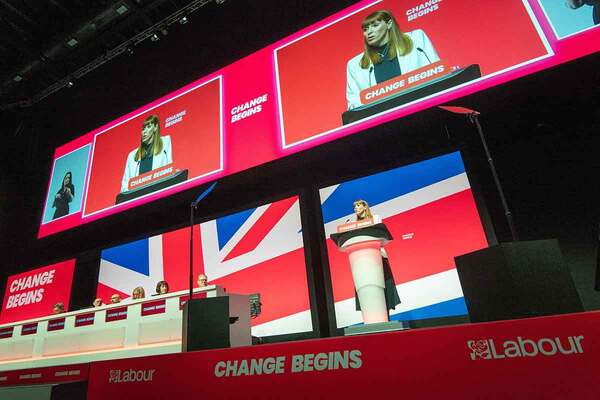Labour conference fringe round-up: encouraging noises, housing as infrastructure and ‘spend to save?’
Social Housing joined the masses descending on a rainy Liverpool last week, to hear what the new government had to say about housing – and what a sizeable sector presence had to say in turn, at fringe events across the city. This is what we heard

Relief… but a need to think long term
“Hallelujah” was the word used by David Orr, former chief executive of the National Housing Federation and current chair of the UK’s largest housing association, Clarion, and for-profit provider Resi Housing.
Speaking on a fringe event alongside housing minister Matthew Pennycook on Monday 23 September, Mr Orr said: “Isn’t it fantastic for us, who’ve been involved in housing for decades, to be talking to a government that wants the same things that we want, and where there is energy and drive and commitment?
“The statements that we’ve been hearing from Angela Rayner and from Matthew are all the kinds of things that we have been looking for, campaigning for, lobbying for, for years and years.
“It is so encouraging for those of us who are battling every day to try to keep the show on the road, to be working with ministers who want the same things that we want, and that is potentially, on its own, transformational.”
But Mr Orr also emphasised that housing does not exist in isolation.
“So much policymaking, so many decisions have been made as though you do something in housing and it has no impact anywhere else. This is complete nonsense.
“Housing is part of, it is core actually, to our success as a nation. It is core to the economy. It is core to our social stability. You have an education service, and we want our kids to do best. How are we going to ensure that they do that if they have nowhere to do homework, if there are nine people living in a three-bedroom flat? How is that even possible for people to make use of those opportunities?
He added: “Across the board, we have been bedevilled by short-term, gimmicky initiatives, nearly always designed primarily to create a headline and a newspaper run for a particular minister at a particular moment in time, responding to something that’s going on at that moment.
“If ever there was something that needs long-term thinking and proper strategic planning, it’s housing.”
A strategy underpinned by good governance
Kate Markey, chief executive of the Nationwide Foundation (and a collaborator with Mr Orr on the Homes for All report launched earlier this year) seconded this need for long-term thinking.
Speaking at the same event in Liverpool, organised by the New Statesman, Ms Markey said: “No modern government has truly articulated a vision and a strategy of what housing is for, and as consequence of that actually we’ve had years and years of siloed policy which has brought unintended consequences.
“I think that we probably can all agree in this room that actually when you think about our housing system, it probably should have a strapline of unintended consequences underneath it, because a system is exactly what it is.
“It is a complex web of economic and societal levers that impact each other. And I think that’s actually where we’ve come to in terms of a siloed approach that we’ve been taking.”
Ms Markey said that above all, there was a need for “good governance” around the housing strategy, and she reiterated the call from the Homes for All report in April for a cross-departmental committee to support this.
“We’re calling for a statutory housing committee that is made up of a mixed group of people that can both hold the government to account, but also support the government in its long-term strategy around housing.”
‘Spend to save’?
Dame Meg Hillier, chair elect of the Treasury Select Committee, who was also speaking at the same event, pointed to the important opportunity of a “spend to save” approach to government spending, while acknowledging that it would be “difficult”.
Ms Hillier, who is the Labour MP for Hackney South and Shoreditch and a former chair of the Public Accounts Committee, began by emphasising that she had “no inside track” on the upcoming Autumn Budget on 30 October, but said: “We think we’re a little bit of a way off spend-to-save at this point, but investment in a decent, safe home we all know is good value for money, because that gives people the platform for the rest of their lives.
“And I often say, perhaps a bit glibly, that in Hackney if you could solve housing and mental health, a lot of the other things would resolve themselves.
“And if you solved housing, then you would solve a lot of the mental health challenges that a lot of people have, and make sure that children have a chance.”
She added: “It’s really important we get it right. There’s a human cost, and there’s also an actual cost. The housing benefit bill is just going up and up. Again, it’s difficult for Matt [Matthew Pennycook] to say here… but we do need to look at how we can spend to save, so we need to change that housing benefit bill into actually spending on housing.
“[It’s] very difficult to do, so I’m not suggesting it’s easy, and the last government repeatedly failed on its target.
“So I think my message to Matt and all of you is give him a bit of space to make sure that the strategy that’s coming out has targets, but that if we miss it by one or two or 100 [homes] we should celebrate the successes.
“And it is proven in the government’s own information that the best value for money is bricks-and-mortar subsidy for social housing.”
Matthew Pennycook: make ‘exemplary development’ the norm
For the housing minster himself, it was market forces and some of those involved in delivery that are in line for a shake-up. Addressing delegates at the New Statesmen event, Mr Pennycook said: “We’ve got to change the dynamics of the housing market.
“We are overly reliant – everyone knows this – on a handful of volume builders that have a particular business model, I’ll put it diplomatically like that.
“We need a much greater focus on that master development role, large sites [with] government involved, using the full powers that the government has to land-assemble, to shape development so that we can bring forward more high-quality, attractive, sustainable places with first-class infrastructure and amenities.
“And when it comes to the debate about housing and whether local areas want it, this, to me, is part of the solution. We’ve got to, in addition to increasing the number of homes we’re building, change the offer for people.
He added: “There is simply too much bad development still happening, and until we change that equation, I don’t think the country is going to accept the housing numbers we need in the right way, and they should be welcoming that development.
“It should be a positive contribution, but we’ve got our role to play in changing the offer about what development means, making, as our manifesto said, exemplary development the norm and not the exception.”
Funding support to meet housing outcomes
Speakers across the conference were keen to emphasise the need for sufficient funding, as well as the right policies, if delivery targets were to be hit. Social Housing attended a discussion organised by the Labour Housing Group on 24 September, entitled ‘The road to building 1.5 million homes’. The group describes itself as a “socialist society affiliated to the Labour Party”.
Addressing attendees, Kate Henderson, chief executive of the National Housing Federation, said that councils and housing associations would need to contribute around a third of new homes annually to meet the government’s target for the current parliament.
“We need to build 300,000 homes a year, and the private sector will make a really important contribution to that, but they’re never going to go further than 200,000, which means we need councils and housing associations to be able to build 100,000 homes a year.”
Ms Henderson said that this had been achieved in the post-war period despite the economic challenges of the time, but that to achieve this volume again a “considerable investment programme from government” would be needed.
“In 2010, the coalition government cut capital budget for affordable housing by 63 per cent. The consequence of that was an absolute crash in the supply of new social rented homes,” she said. “We’ve had years of rent cuts, we’ve had rent caps, and that is all taking capacity away from councils and housing associations’ ability to invest in their business. So we need to rebuild confidence, and we need to rebuild capacity.”
Alongside establishing an appropriate and stable long-term rent settlement, the government would need to boost funding for new homes as well as providers’ ongoing expenditure on building safety remediation, Ms Henderson told delegates.
“We need an immediate cash injection into the Affordable Homes Programme. There’s sites right across the country that are good to go but they don’t have enough public money available right now.
“[And] we need to widen access to building safety funding. It is an absolute scandal that the funding settlement for building safety is only available to private owners.”
Finally, Ms Henderson stressed the difference between outcomes and outputs. “One-and-a-half million homes – that’s the output. The outcome is people being well housed.”
Referring to the Labour Party’s ambition for a “mission-led” government, she added: “Actually, housing has got to be at the heart not just of the mission of economic growth, but for building a society where everyone has a decent roof over their head.
“I think it isn’t just an ambition to build one-and-a-half million homes, though. It’s the type of homes, the quality of homes, for us, a really, really strong commitment on social and affordable housing.”
Apply an ‘infrastructure’ label?
Also mentioned on several housing panels throughout the conference was the idea that applying the label of ‘infrastructure’ or ‘social infrastructure’ to housing, formally or informally, could support the advent of greater public and private investment in the sector.
Speaking at a breakfast briefing on 23 September, Priya Nair, chief executive of The Housing Finance Corporation, said: “There are definitely other sectors [and] other funding models we should look at across the infrastructure sphere. I see housing as very much part of the national infrastructure discussion.
“Some people call it ‘social infrastructure’, but it seems like the current government is focused on using housing as a way to drive economic growth, and I think as a consequence, the discussion needs to be elevated to look at housing as a way to drive that economic growth, to speak about it as national infrastructure.
“I think that will very much marry in with that wall of private capital who are looking to deploy in areas that not just give them the financial return, but also give them returns that are giving them social impact.”
Ms Nair, who joined the sector funding aggregator in March, has a background in the capital markets as well as private equity infrastructure investment. The organisation recently announced a new strategy that would include opening its offer to include for-profit housing providers for the first time, as well as a previously trailed partnership with the UK Infrastructure Bank to launch a new financial debt guarantee to support retrofit.
At the breakfast event, run by Inside Housing and law firm Weightmans, Ms Nair said that creating the right investment climate to support the “crowding-in of private capital” would be key for housing.
“[Defined contributions (DC)] pensions are definitely a source of that capital that we need to solve for, and I think that’s the case for… infrastructure as an asset class as a whole.
“Everyone’s trying to figure out how to tap that DC pension money, given it’s quite different to what has historically been the big investor in infrastructure.”
Melanie Leech, fellow event panellist and chief executive of the British Property Federation, said that a holistic view should be taken of what infrastructure actually is, with housing a part of this.
“Infrastructure, for me, is what underpins life, and that’s everything from homes to workplaces to transport to digital to the logistics sector. And you don’t necessarily need to label it all as infrastructure, but you have to understand how it all fits together, and you have to have a strategy that allows it all together to plan holistically.”
However, speaking on a separate session at the conference, Torsten Bell, Labour MP for Swansea West and the immediate past chief executive of thinktank the Resolution Foundation, said that redefining investments is not worth the effort when the challenges lie elsewhere.
Mr Bell was speaking on a session hosted by fellow thinktank IPPR, entitled ‘How can the Labour government supercharge public and private investment?’. In response to a question from Social Housing, Mr Bell said: “I just wouldn’t bother with faffing around with the language.
“That’s not the barrier to social housing investment today, the barrier to social housing investment is the amount of public funds, the level of interest rates, the balance sheets of some of our housing associations and obviously our councils.”
RELATED







